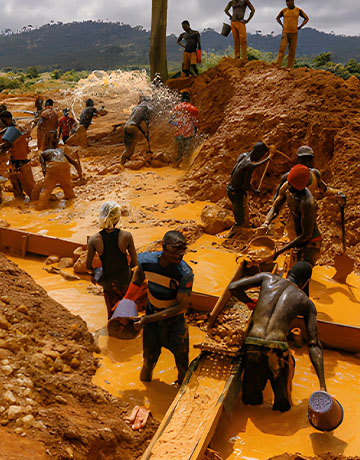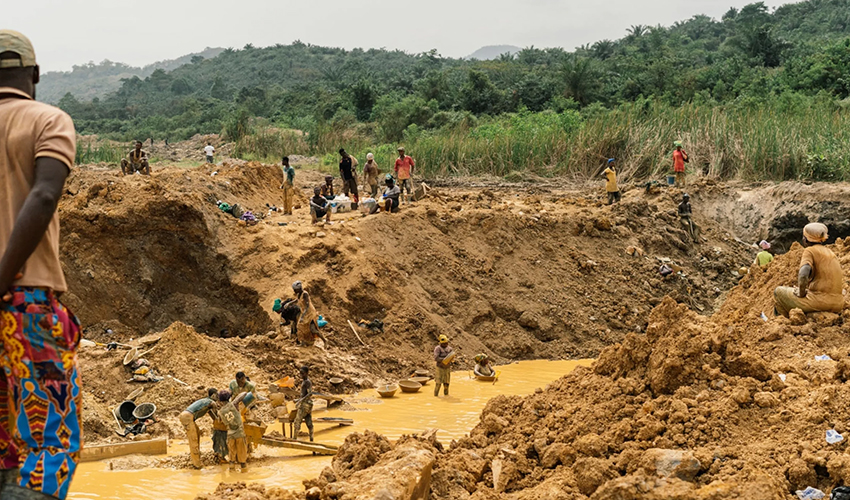Illegal small-scale mining, commonly known as “galamsey,” has become a significant environmental issue in Ghana. This practice has devastating effects on the country’s water bodies, leading to severe consequences for both the environment and the communities that rely on these water sources. As a non-profit organization, Opportunity Two Excel Foundation is committed to raising awareness and advocating for sustainable solutions to this pressing problem.
The Rise of Galamsey
Galamsey has proliferated due to several factors, including high unemployment rates, poverty, and the allure of quick financial gains. Despite being illegal, the practice continues to thrive, often with the complicity of local authorities and some community members. The miners use rudimentary tools and techniques, which not only degrade the land but also pollute water bodies with harmful chemicals.


Environmental Impact
- Water Pollution: One of the most immediate and visible impacts of galamsey is the pollution of water bodies. Miners use mercury and cyanide to extract gold, which then leaches into rivers and streams. These toxic substances contaminate the water, making it unsafe for drinking, irrigation, and aquatic life.
- Deforestation: To access gold deposits, large areas of forest are cleared, leading to loss of biodiversity and disruption of ecosystems. The removal of vegetation also increases soil erosion, which further contributes to the sedimentation of rivers.
- Habitat Destruction: The excavation and dredging activities associated with galamsey destroy habitats for many aquatic and terrestrial species. This loss of habitat can lead to a decline in wildlife populations and disrupt the balance of local ecosystems.
Health Implications
The contamination of water bodies has dire health consequences for communities. People who rely on these water sources for drinking, cooking, and bathing are exposed to harmful chemicals, which can lead to serious health issues such as:
- Mercury Poisoning: Long-term exposure to mercury can cause neurological and developmental problems, particularly in children.
- Waterborne Diseases: Polluted water can harbor pathogens that cause diseases like cholera, dysentery, and typhoid fever.
- Skin Conditions: Direct contact with contaminated water can result in skin irritations and infections.
Economic Consequences
While galamsey may provide short-term financial benefits to miners, the long-term economic costs are substantial. The degradation of water bodies affects agriculture, fishing, and tourism, which are vital sources of income for many communities. Additionally, the government incurs significant expenses in efforts to clean up polluted water bodies and restore damaged ecosystems.
Efforts to Combat Galamsey
The Ghanaian government, along with various non-governmental organizations, has implemented several measures to combat galamsey. These include:
- Regulatory Enforcement: Strengthening laws and regulations to deter illegal mining activities and holding offenders accountable.
- Community Engagement: Educating communities about the environmental and health impacts of galamsey and promoting alternative livelihoods.
- Rehabilitation Projects: Initiating projects to restore degraded lands and water bodies, such as reforestation and river dredging.
Opportunity Two Excel Foundation’s Role
At Opportunity Two Excel Foundation, we are dedicated to supporting these efforts through:
- Awareness Campaigns: Conducting educational programs to inform the public about the dangers of galamsey and the importance of protecting our water bodies.
- Advocacy: Working with policymakers to develop and implement effective strategies to combat illegal mining.
- Community Support: Assisting affected communities in finding sustainable and legal alternatives to galamsey, such as agriculture and eco-tourism.
Conclusion
The fight against galamsey is crucial for the preservation of Ghana’s water bodies and the well-being of its people. By raising awareness and advocating for sustainable practices, Opportunity Two Excel Foundation aims to contribute to a future where natural resources are protected, and communities can thrive without compromising their health and environment.


